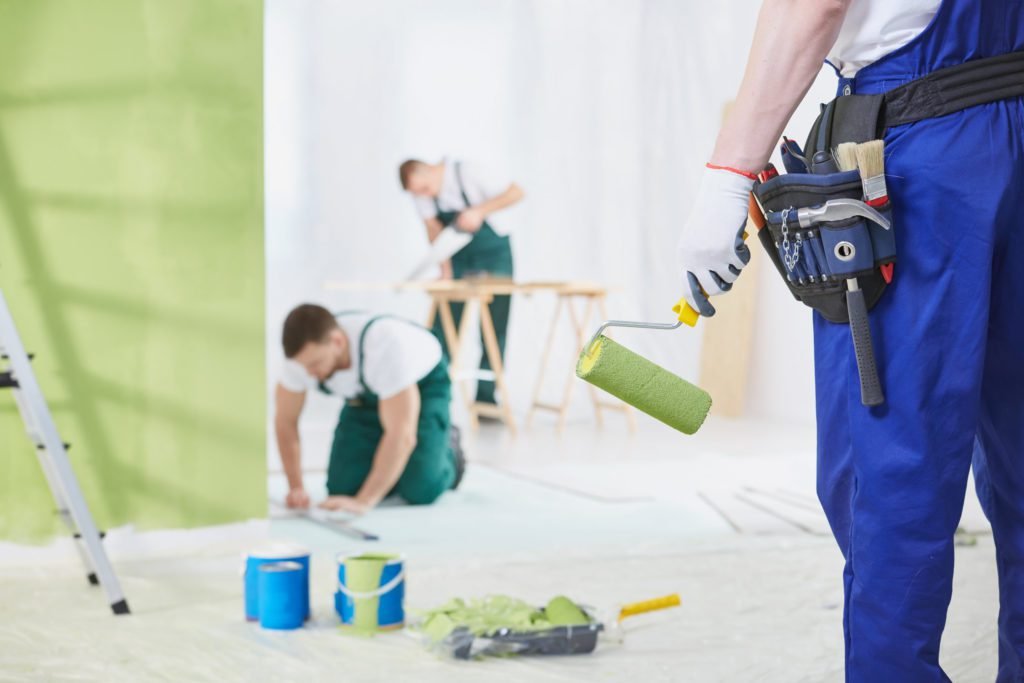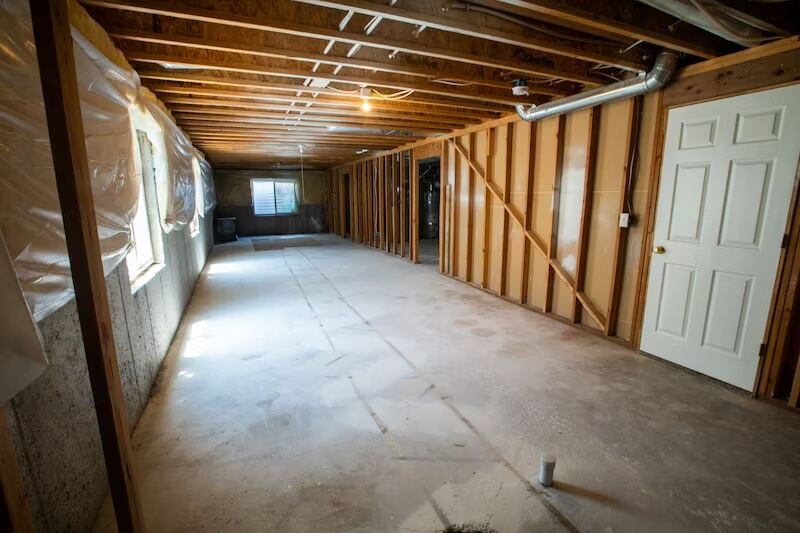Key Summary
- Professional painters are ideal for high ceilings, damaged walls, complex jobs, and tight deadlines, ensuring safety and quality.
- DIY painting is suitable for simple colour changes, minor touch-ups, small rooms, and is cost-effective with quality tools.
- Quality tools and preparation, including primer and surface cleaning, are vital for a successful DIY paint job.
- When hiring a professional decorator, check references, insist on a written contract, and prioritise communication.
- Painting costs in the UK vary; high-quality paint is recommended for longevity and appearance.
When to Use a Professional Painter For Your Home
High Ceilings and Difficult-to-Reach Areas
Homes that feature towering ceilings or span across multiple stories can pose significant safety challenges for those opting for a DIY route. These areas often require specialised equipment and precise techniques. Professional painters come equipped not only with the right tools but also the expertise to manage such challenges efficiently and safely.
Addressing Poor Quality Walls
Damaged walls with issues such as cracks, peeling paint, or other irregularities will benefit from a professional touch. Such imperfections often demand intensive surface preparation, and a professional can ensure that the finish remains smooth and long-lasting, reducing the chance of problems resurfacing.
Managing Complex Paint Jobs
Certain painting tasks require expertise, for example, intricate designs, removing old wallpaper, and use of multiple colours or finishes. Such tasks are not just skill-intensive but can also be quite time-consuming. A professional painter has the dexterity and patience to ensure that complex jobs are handled perfectly, often with a level of finesse hard to achieve otherwise.
Meeting Tight Deadlines
There might be situations where you’re racing against the clock, maybe because of an imminent event, an impending home sale, or personal reasons. In such cases, the efficiency of professional painters can be a lifesaver. They often operate with a team, ensuring that the project is completed not only to perfection but also within the required time frame.
Benefits of Professional Painter For Your Home
There are numerous advantages to hiring a professional painter for your project, these include:
Get the Job Done Fast
A professional team can complete the painting process in a fraction of the time it might take you to do it alone.
Superior Quality and Finish
Professionals have extensive experience and knowledge, ensuring a flawless and smooth finish.
Appropriate Materials
Not all surfaces and rooms are the same. A professional will select paints and finishes that are best suited for specific rooms like bathrooms, kitchens, or exteriors, considering factors like humidity and exposure.
Bring Visions to Life
Decorators can help to make your vision and design ideas a reality. Adam, from My Local Tool Box says “Painters and decorators can help make your house a home. Whether you’ve just moved in or fancy a change, they can help make it your own.” So if you have an idea, but struggle to bring it to fruition, it may be time to get the professionals in!
No Cleanup Stress
Once the job is done, professionals take care of the cleanup, leaving your space spotless.
When to DIY Your Painting at Home
Simple Colour Changes
If your walls are already in impeccable condition and you’re only looking for a colour revamp, a DIY approach might be all you need. Go for a DIY approach if the task is straightforward and doesn’t require specialised techniques or tools other than regular painting essentials.
Minor Touch-Ups
From time to time, a small scratch or a faded spot might catch your eye. For these minor touch-ups, it’s often easier and faster to handle it yourself rather than calling in a professional.
Small Room Makeovers
Rooms like a child’s bedroom or a home office, which are smaller in size, can be the perfect projects for DIY enthusiasts.
Cost Efficiency with Quality Tools
Whilst choosing a DIY approach can be cost-effective, particularly if you’re utilising paint you already possess, it’s crucial not to skimp on the tools. You might spend £50 on a litre of paint, but applying it with a cheap roller won’t deliver the desired outcome. It’s essential to invest in top-quality tools, as they significantly influence the finish of your painting.
Tips on Painting Your House
If you opt for a DIY project by painting your own house , follow these guidelines for optimal results:
Gather Inspiration
Before you start, have a clear plan of how you want to decorate the room. Consider the space, both in terms of size and style, and ask yourself what you would like the end result to be.
Quality Over Price
Always select high-grade paint and tools. They last longer and provide a superior finish.
Preparation is Key
Clean and prime your walls. Removing dust and dirt ensures a smoother application and better adhesion.
Test Paint Colours
Before committing to a large quantity, test your selected shades in a small area. Observe them under different lighting conditions to ensure you’re satisfied.
Use Painter’s Tape
This aids in achieving sharp edges and prevents paint from getting onto unwanted areas.
What to Avoid When Painting a Home
Embarking on a DIY painting project can be both exciting and daunting. To ensure a smooth, professional-like finish, it’s essential to be wary of some common missteps that could hamper the final result:
Skipping Primer
Primer ensures old paint is effectively covered and aids new paint adhesion. Without it, the finish might peel or reveal the old shade.
Overloading the Brush or Roller
Overloading leads to drips or uneven application. Dip only a third of the brush into the paint and remove excess.
Neglecting Surface Preparation
A clean surface is essential for paint adhesion. Ensure it’s free from dirt and grime to prevent peeling or unsightly spots.
Ignoring Safety Precautions
When painting, especially at heights or with chemicals, always prioritise safety. Use stable ladders, protective gear, and ensure proper ventilation indoors.
What to Avoid When Getting a Professional Decorator
Hiring a professional decorator can elevate the aesthetics of your space, but it’s essential to make informed decisions during the selection process. Here are some pitfalls to avoid to ensure you get the best value and outcome:
Neglecting to Check References
Always check references or portfolios to gauge a decorator’s quality, reliability, and past client experiences.
Forgoing a Written Contract
A written contract eliminates potential disputes, documenting details like costs, services, and materials. It’s a must-have for clarity.
Making Choices Based Solely on Price
Don’t choose a decorator solely based on cost. Consider experience, materials, warranty, and testimonials.
Overlooking Communication Skills
Clear communication is essential. Ensure your decorator is receptive to ideas, provides feedback, and remains accessible throughout.
Not Discussing Cleanup and Aftercare
Discuss cleanup responsibilities and aftercare advice before starting. This ensures a tidy space post-project and ongoing maintenance guidance.
Costs of Painting Your House vs Professional Decorator
One key benefit of DIY painting is how much less it can cost to paint your house in comparison to having professionals in. Take a look at the average costings:
DIY Painting
Paint
Depending on the brand and quality, paint can range from £10 to £50 per litre.
Brushes and Rollers
A good set can cost between £10 to £30.
Primer
Essential for many projects, it ranges from £10 to £40 per litre.
Other Supplies
Items like painter’s tape, drop cloths, and paint trays might add another £10 to £50.
Total DIY Cost
If you’re painting a standard room of about 20 square metres, your DIY costs could range from £50 to £200, excluding any tools you might have to purchase or hire.
Professional Decorator
Labour
A professional decorator typically charges between £100 to £200 per day, depending on experience and location.
Materials
While professionals can often access trade discounts, they typically use higher-end materials, ensuring longevity and a superior finish. This might cost anywhere from £20 to £70 per litre, depending on the paint quality.
Additional Costs
Some professionals may charge extra for wall repairs, moving furniture, or using specialised equipment.
Total Professional Cost
For a standard room of about 20 square metres, hiring a professional could set you back anywhere from £250 to £800, depending on the extent of the work and the materials used.
FAQs Related to DIY vs Hiring Professional Painter
How Often Should I Repaint My House?
Typically, exteriors need repainting every 5-10 years, while interiors vary by room, ranging from 3 years (for high-traffic areas) to 7+ years for bedrooms or formal spaces.
Is it Worth Investing in High-Quality Paint?
Absolutely. High-quality paint provides better coverage, lasts longer, and often has better colour retention.
Conclusion
Deciding between painting your house yourself or hiring a professional is dependent on various factors, such as the complexity of the job, the condition of your walls, and your skill level.
Whichever route you opt for, ensure you’re well-informed, adequately prepared, and equipped with the right tools or the right professional to achieve the desired outcome. The brilliance of freshly painted walls not only rejuvenates the aesthetics of a home but also reflects the care and love poured into maintaining it.
Recommended Posts:














